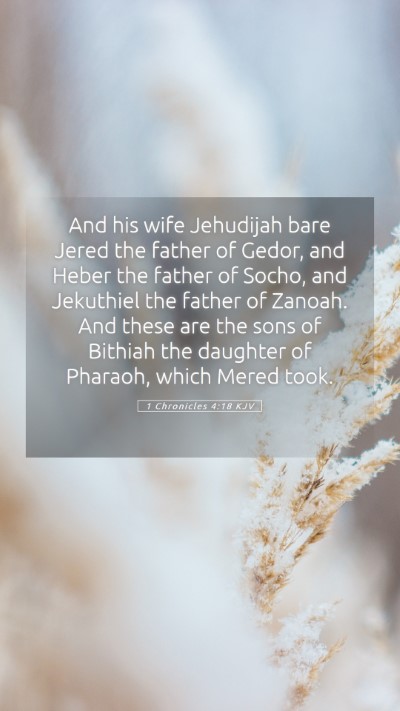Bible Verse Meaning for 1 Chronicles 4:18
The 1 Chronicles 4:18 verse, nestled within the genealogical records of the tribe of Judah, touches on the lives of several key individuals. This verse articulates familial connections and the blessings bestowed upon specific dynasties, shedding light on broader themes of lineage, heritage, and divine favor in biblical narratives.
Understanding Scripture: Insights into 1 Chronicles 4:18
This verse emphasizes the importance of family and legacy in biblical thought. It highlights the interactions between various familial branches and their impact on the community of God's chosen people.
Verse Text
“The wife of Helon bore him (the descendants of) the clans of Zorathites, and the sons of Ishi, and among the sons of Ishi are the sons of Nethanel.” (1 Chronicles 4:18)
Bible Verse Explanations
Understanding this verse can be enhanced by diving into various commentaries:
-
Matthew Henry’s Commentary:
Henry emphasizes the significance of family ties, illustrating how individual stories contribute to the larger narrative of God’s people. He points out the implications of these genealogies in establishing God’s providential plan through generations.
-
Albert Barnes’ Notes:
Barnes discusses the historical context of such genealogical records, noting how they served to affirm the identity and inheritance of the Israelites. He highlights that these records were not merely for historical purposes but also carried spiritual significance, showcasing God's enduring promise to each line of descendants.
-
Adam Clarke’s Commentary:
Clarke elaborates on the intricacies of familial connections made in the verse, offering insight into the cultural practices of lineage that underscore the importance of names and properties within the Israelite community.
Biblical Exegesis
From a biblical exegesis perspective, this verse can be analyzed for its placement within the broader narrative of 1 Chronicles, which prioritizes the tribal lineage and divine connections of Israel. Each name and lineage serves a purpose in illustrating God's covenantal promise and preserving the heritage through generations.
Bible Study Insights
- Importance of Genealogy: The emphasis on genealogy signifies the importance of remembering one's roots and the legacy of faith and blessings passed down through generations.
- Divine Favor: This verse showcases the idea that God’s blessings are often manifested through families, demonstrating an interconnectedness that implies a shared responsibility towards God's covenant.
- Cultural Relevance: The customs surrounding marriage and family in ancient Israel elucidate societal values that continue to inform current discussions on family heritage and faith.
Application of the Verse
When interpreting 1 Chronicles 4:18 in a modern context, one can reflect on how to honor their lineage and the significance of family ties in our spiritual journey today. This verse challenges believers to consider their role within their families and communities as integral threads woven into God’s overarching narrative.
Historical Context of Bible Verses
The establishment of genealogies in ancient Israel serves multiple purposes, including legal rights to land, inheritance, and a reminder of God’s lasting promises. Understanding this historical context helps enrich the study and comprehension of the text.
Cross References
Related scriptures that enhance the understanding of 1 Chronicles 4:18 include:
- Genesis 29:35: The significance of lineage through Jacob's sons.
- Matthew 1:12: The New Testament genealogy reflecting the fulfillment of Old Testament prophecies.
- Numbers 1:20: God's command to take a census, emphasizing the importance of tribes and family units.
Conclusion
In summary, 1 Chronicles 4:18 serves as a reminder of the importance of our roots, the significance of God's blessings through family, and the profound impact of history on our understanding of faith. Through Bible verse interpretations, believers can find insights that encourage them to engage with their heritage while recognizing God's active role in family dynamics and individual lives.


